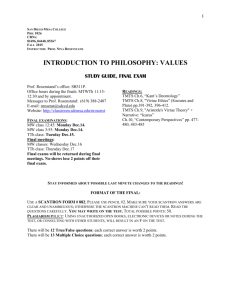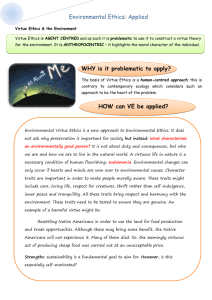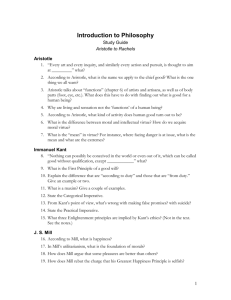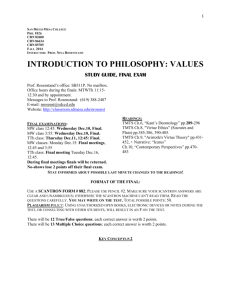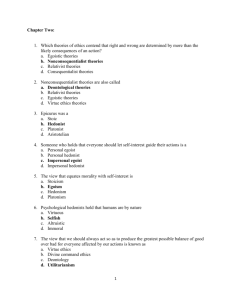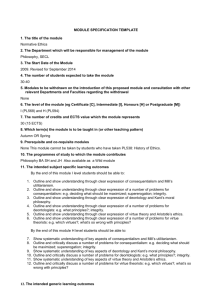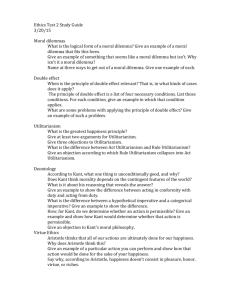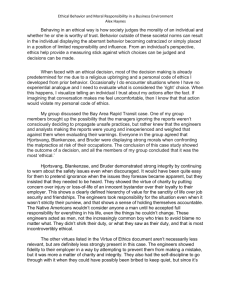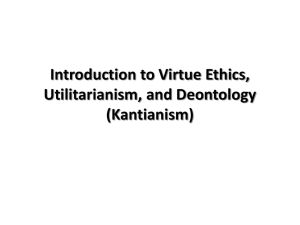final study guide
advertisement
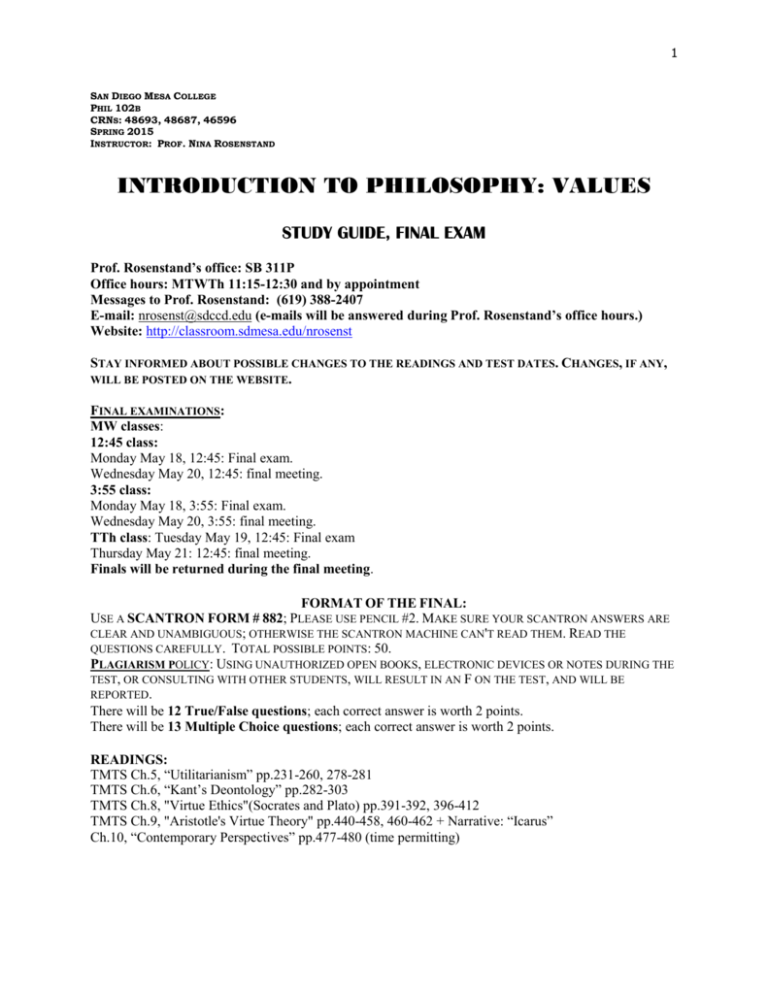
1 SAN DIEGO MESA COLLEGE PHIL 102B CRNS: 48693, 48687, 46596 SPRING 2015 INSTRUCTOR: PROF. NINA ROSENSTAND INTRODUCTION TO PHILOSOPHY: VALUES STUDY GUIDE, FINAL EXAM Prof. Rosenstand’s office: SB 311P Office hours: MTWTh 11:15-12:30 and by appointment Messages to Prof. Rosenstand: (619) 388-2407 E-mail: nrosenst@sdccd.edu (e-mails will be answered during Prof. Rosenstand’s office hours.) Website: http://classroom.sdmesa.edu/nrosenst STAY INFORMED ABOUT POSSIBLE CHANGES TO THE READINGS AND TEST DATES. CHANGES, IF ANY, WILL BE POSTED ON THE WEBSITE. FINAL EXAMINATIONS: MW classes: 12:45 class: Monday May 18, 12:45: Final exam. Wednesday May 20, 12:45: final meeting. 3:55 class: Monday May 18, 3:55: Final exam. Wednesday May 20, 3:55: final meeting. TTh class: Tuesday May 19, 12:45: Final exam Thursday May 21: 12:45: final meeting. Finals will be returned during the final meeting. FORMAT OF THE FINAL: USE A SCANTRON FORM # 882; PLEASE USE PENCIL #2. MAKE SURE YOUR SCANTRON ANSWERS ARE CLEAR AND UNAMBIGUOUS; OTHERWISE THE SCANTRON MACHINE CAN'T READ THEM. READ THE QUESTIONS CAREFULLY. TOTAL POSSIBLE POINTS: 50. PLAGIARISM POLICY: USING UNAUTHORIZED OPEN BOOKS, ELECTRONIC DEVICES OR NOTES DURING THE TEST, OR CONSULTING WITH OTHER STUDENTS, WILL RESULT IN AN F ON THE TEST, AND WILL BE REPORTED. There will be 12 True/False questions; each correct answer is worth 2 points. There will be 13 Multiple Choice questions; each correct answer is worth 2 points. READINGS: TMTS Ch.5, “Utilitarianism” pp.231-260, 278-281 TMTS Ch.6, “Kant’s Deontology” pp.282-303 TMTS Ch.8, "Virtue Ethics"(Socrates and Plato) pp.391-392, 396-412 TMTS Ch.9, "Aristotle's Virtue Theory" pp.440-458, 460-462 + Narrative: “Icarus” Ch.10, “Contemporary Perspectives” pp.477-480 (time permitting) 2 KEY CONCEPTS: TMTS Ch.5, “Utilitarianism” pp.231-260, 278281 The Principle of Utility = the Greatest Happiness Principle Utilitarianism is a consequentialist theory Jeremy Bentham’s hedonistic calculus The hedonistic calculus allows for animal suffering to be taken into consideration Pros: easy to use, egalitarian Cons: shows bias; can be manipulated; reduces pains, pleasures and people to “sheer numbers” Descartes: animals have no minds and can’t feel pain The hedonistic calculus would approve of torture if yielding good results John Stuart Mill: Bentham’s godson, tutored childhood, nervous breakdown at 20 Relationship with Harriet Taylor: intellectual partnership. Women’s rights advocates. Mill: 3 areas of influence in philosophy: Women’s rights, Higher and Lower Pleasures Theory, and the Harm Principle Theory Bentham’s utilitarianism was unpopular in Victorian England Mill’s revision of Bentham’s utilitarianism: some pleasures are higher, and some are lower Mill: “Better to be a human being dissatisfied than to be a pig satisfied, better to be Socrates dissatisfied than a fool satisfied” Mill: The harm principle: individuals and state should only interfere if someone does harm to others, not to themselves Mill: Right to privacy is a major point in the harm principle: consenting adults. Mill: Children and immature adults are excluded from the harm principle for their own protection Mill: “Backwards nations” are also excluded, and should be ruled by civilized nations, for their own good Mill was colonial administrator of India MW classes: Narrative: The Invention of Lying. Mark lies to his dying mother about life after death, with good or bad consequences? TMTS Ch.6, “Kant’s Deontology” pp.282-303 Immanuel Kant, German philosopher The good will: good intentions to respect moral law; consequences don’t count “The good will shines like a jewel by its own light” The store owner’s 4 options hypothetical imperatives: If I want X, then I must do Y, conditional command The categorical imperative: Absolute moral command Structure of cat.imp.: State your maxim, universalize it, ask if it is rational. Maxim = principle for an action Universalization = making a maxim into a universal law Example: the man who wants to borrow money autonomous lawmaker = using cat.imp. to set moral rules for oneself Kant’s assumption: reason is universal 5 Criticisms: 1) Mill: Kant is referring to consequences; 2) cat.imp. doesn’t solve conflict between duties; 3) the loophole, making the maxim too specific; 4) What is rationality? Depends on goal; 5) Cat.imp. allows for no exceptions (example: the killer at the door) Intrinsic value vs. instrumental value Kant: rational beings should be treated as “endsin-themselves” “means to an end” vs “merely a means to an end” (use vs. abuse, disrespect) “ends in themselves”: respect for rational beings including yourself rational persons vs. non-rational things Problems: what about humans who are not rational, and animals Kant regards animals as things Kant’s last book: invented concept in-between “person” and “thing,” for humans. Not for animals. But Kant was against animal experiments. Kingdom of Ends: Kant’s utopia, using cat. imp. and treating people with respect TMTS Ch.8, "Virtue Ethics" pp.391-392, 396412 ethics of conduct (what to do?) vs. virtue ethics (how to be?) virtue (arete: excellence) The late 20th century revival of virtue ethics [from your notes] Christianity (God gets credit for good character) vs. ancient virtue ethics (you take credit for creating your own good character) The charges against Socrates: offending gods, corrupting youth Socrates’ final words: owing a rooster to Asclepius Socrates: People do morally wrong acts out of ignorance Plato: 3 parts of the soul: reason, willpower, appetites 3 corresponding virtues: wisdom, courage, temperance Freud’s three parts of the psyche: id, ego, superego 3 Plato’s three sections of the ideal state: philosopher-kings, police & military, and the general population Women’s place in the ideal state determined by talent, not gender. So: women in gov’t, and military. TMTS Ch.9, "Aristotle's Virtue Theory" pp.440458, 460-462+ Narrative: “Icarus” Aristotle's theory of four causes: material, efficient, formal, final teleology: theory of purpose teleological explanation vs. causal explanation (“giraffes”) the Golden Mean= relative mean between extremes of excess and deficiency examples of virtues (courage, pride, anger, etc.) happiness (eudaimonia) is the reward of virtue Aristotle had enormous influence on Western and Middle Eastern thinking. Problems with ancient virtue ethics: undemocratic; can’t solve difference of opinion. Narrative: “The Flight of Icarus”: the Golden Mean: not too high, not too low examples of virtues (courage, pride, anger, etc.) happiness (eudaimonia) is the reward of virtue Time permitting: Ch.10, “Contemporary Perspectives” pp.477480 The late 20th century revival of virtue ethics by Philippa Foot and others The political aspect of conduct vs. character: Are social policies more important than a politician’s character? 4 NOTES
